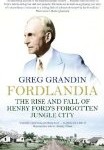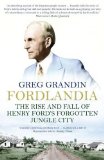In 1927, Henry Ford, founder of the Ford Motor Company, bought a 5,000-square-mile area of the Amazon rain forest. He wanted to combat rising rubber costs by creating his own supply and to bring his idealised version of America to a remote area of Brazil. Ford created a small town in the middle of the rain forest. Neat rows of houses were built, along with everything an American family would need to entertain them. Unfortunately golf courses and cinemas were not enough to distract from the dangerous wildlife and diseases that plagued Fordlandia. The battle between Man and nature was constant and it wasn’t long before Ford’s dream of creating a civilized society in the jungle was shattered.
I knew nothing about Ford’s jungle city and was intrigued by a community constructed from scratch. Unfortunately the book was more like a biography of Henry Ford than an insight into life in the jungle and so there were many points when I found this read frustrating.
It was interesting to learn about Ford’s ideas for creating perfect societies. I thought his plan to build cities in long lines, instead of around a dense city centre made a lot of sense and I admired his desire to give everyone high wages and free health care, but I thought there was too much politics in this book. My lack of knowledge of US politicians in the 1930s compounded the problem, but I think that even if I had known who all the people were I would still have become bored by the level of detail.
Most of the country’s prominent liberal internationalists, intellectuals, and religious leaders, like William Jennings Bryan, William Howard Taft, and Louis Brandeis respectfully declined the industrialist’s invitation to join his odyssey. “My heart is with you,” apologized Helen Keller for not being able to make the trip. Jane Addams did accept but fell ill and couldn’t sail. That left Ford with an odd and volatile assortment of lesser-known dissenters, vegetarians, socialists, pacifists and suffragists as companions.
I loved learning about the construction of Fordlandia, but I longed for some personal or emotional insight into the town. The facts were delivered in a cold, clinical way and I wish they had been brought to life by focusing on individuals instead of just general statistics.
By the end of 1929, ninety people had been buried in the company cemetery, sixty-two of them workers and the rest “outsiders who had died on the property.” Most of the deaths were from malnutrition and common disease. But lethal snakebites, from vipers especially, infections from ant, hornet, or vampire bat bites, and, before proper shelters were built, jaguars, which occasionally snatched babies right from their hammocks, all made the plantation especially dangerous during those early years.
The density of the facts meant that this was a very slow book for me to read. I couldn’t manage more than a few pages at a time and often became bogged down in the detail. This book is very well researched and contains everything you could ever wish to know about Henry Ford, but I hope that someone grabs this idea and creates a wonderful piece of historical fiction from it.


19 replies on “Fordlandia – Greg Grandin”
Such a pity the book was disappointing. The premise sounds good.
I’m sure there are (other) biographies of Ford so it would have been nice if this book concentrated more on the topic at hand. But well, that’s the author’s choiuce of course.
Judith, A large portion of the book was dedicated to Fordlandia, but it was much more about his policies than what life was actually like out there. I’m sure this will be of interest to a lot of people, but it wasn’t really what I expected from the blurb.
I certainly get the sense of Ford’s hubris from your description. Sounds like more could have been made of the controlling nature of someone who made a fortune from the assembly line wanting to control both nature and life in his very own town.
Lynne, Exactly! Poor Ford couldn’t conrol everything he wanted to. 😉
I think this sounds interesting. Too bad it’s more about Henry Ford, but that still interests me too 🙂 Historical Fiction set in Fordlandia would also be interesting though!
Amy, I think you enjoy fact filled non fiction a lot more than I do. You’ll probably enjoy this one 🙂
Very interesting! I’d never heard of it either. Did Ford himself ever lived there, even if just for a little while, to set the example? What’s left of it now, did the forest take over completely? (Alex opens Wikipedia…)
(Was I the only one thinking of The Darma Corporation while reading this?)
Alex, Is this the point where I’m supposed to say you’ll have to read the book to find out?!
Ford never lived there. In fact he didn’t even visit it! The town of Fordlandia is now in ruins and the cleared forest space is used to graze cattle. I’d love to visit it!
It sounds fascinating- I had no idea Ford built a town in the jungle!- but I’d be frustrated by exactly the same things you were. I’d want to read about the living-in-the-middle of the jungle experience, not all about politics and Ford himself (especially if he never went there!)
Jeane, Just not our sort of book 🙂
Well that is a missed opportunity! My dad is a dyed-in-the-wool domestic car guy (until he dies he would never buy a foreign vehicle) and I’ve grown up around that mantra. The fact that I’ve NEVER HEARD of this town in the jungle is blowing my mind. Obviously, right plot, wrong author.
Sandy, I wouldn’t say wrong author. Grandin is a very talented author, but his style of writing isn’t for me. I’ve never been a big non-fiction reader and so found this too laden with detail, but I’m sure a lot of people love this sort of thing.
I like factual based non-fiction, but there has to be SOME storytelling aspect to it to keep it from being dry and boring.
Anbolyn, There is quite a bit of storytelling in this book, but it didn’t have the emotional connection I like. I would never describe this book as boring as I came away with a lot of new knowledge, but it was a very slow read. You might like it 🙂
This book sounds so interesting! My husband read it and really enjoyed it. He’s a big nonfiction reader, but I usually prefer fiction. Dense nonfiction takes too long to get through and doesn’t usually provide the escape I get with fiction. I love the idea of someone writing a novel based on Ford’s project, though — I’d read it!
Erin, You make a good point about the escape factor. You can’t get lost in another world when you are continually bumping into statistics. This book is an interesting resource and I know a few people who will love it, but it wasn’t for me 🙁
It would be fascinating to read a diary of a person who lived in Fordlandia but it sounds like there wasn’t enough about what the place was actually like. If the book focused too much on Ford I’d rather read a good biography of him.
Kathleen, I couldn’t agree with you more 🙂
[…] Fordlandia – Greg Grandin […]